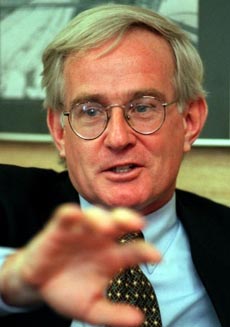
When Paraguay RPCV Tom Murphy first took office in January 1994, Pittsburgh was suffering from one of the worst inferiority complexes in its history
When Tom Murphy first took office in January 1994, Pittsburgh was suffering from one of the worst inferiority complexes in its history.
The city had yet to right itself after wrenching changes in the steel industry that began in the early 1980s. Government finances were in a sorry state, with a $32 million deficit, and there was no serious plan for an economic turnaround. Younger, college-educated workers were leaving in droves, and older residents were pessimistic about the region's future.
Even the physical environment reflected the economic and psychological depression running through the region. Land on both sides of the city's three rivers, the defining boundary of Downtown and the international symbol of the city, was an eyesore. The riverbanks were blighted by the rusting carcasses of abandoned steel mills and businesses that discouraged pedestrian access to the rivers.
The city had such a poor reputation for offering recreational opportunities that Bicycling Magazine rated Pittsburgh as one of the worst cities in the country for bike riding in a metropolitan area.
The city was desperate for a leader who would direct a physical and psychological turnaround.
After two terms in office, the Pittsburgh that Tom Murphy inherited is a dim memory. Replacing it today is a high-energy, cosmopolitan city that glows with optimism about its future.
As a government manager, Murphy trimmed the city's workforce by more than 1,000, a reduction of nearly 21%. He turned yearly runaway budget deficits into budget surpluses. In fact, he just completed his third consecutive budget agreement with City Council that carries a healthy cash balance.
As an economic revitalization visionary, Murphy has directed more than $4 billion in new investment in the city -- from office towers for two of the city's nationally ranked banks to new world-class facilities for the city's professional football and baseball teams to an expanded Downtown convention center.
City neighborhoods, tarnished from decades of neglect, have been refurbished through the mayor's Neighborhood Needs Program. This has included improvements to basic infrastructure like streets and sidewalks. Nearly all of the city's 169 neighborhood playgrounds have been renovated to meet or exceed today's most stringent safety standards. That effort recently won Pittsburgh an award from the Consumer Products Safety Commission, the first ever given to a public body.
As a technology booster, Murphy has made Pittsburgh a model for Northeastern cities transitioning from heavy industrial-based economies. The city is now experiencing an explosion of new economic ventures with anchors in high technology and internet-based start-up companies. Nationally known E-commerce start-ups like Freemarkets, technology heavyweights like Seagate and venture capital investors like Red Leaf have committed to Pittsburgh. The Murphy Administration has also encouraged government-higher education partnerships with world-class local universities, especially Carnegie Mellon and the University of Pittsburgh. Included in this, is the recent move by RAND, the world's best-known policy research think tank, to locate its fourth worldwide office in Pittsburgh.
According to a recent survey by the Pittsburgh Technology Council, Pittsburgh now has more jobs available in the technology field than people to fill them. Many of the city's more traditional Fortune 500 corporations like PNC Bank and Mellon Bank have given new votes of confidence to the city, both of which are constructing new operations centers fixing more than 6,000 jobs in the heart of Downtown. The world's primary aluminum producer, Alcoa, has built its new world-headquarters on the Downtown's North Shore riverfront and Heinz Corporation has announced a multi-million-dollar expansion of its manufacturing operations here. All of these were completed with incentives provided by Murphy Administration programs.
Part of what has attracted cutting-edge companies and hundreds of talented professionals to settle here in recent years is the success of the quality of life initiatives begun in Murphy's first term and now bearing fruit. The mayor has directed the clean up and redevelopment of former industrial sites -- brownfields -- into some of the most pristine and exclusive residential communities in the city. He has been a leader in the national Rails-To-Trails movement, supervising the building of nearly 14 miles of trails that run through the center of the city and that connect to the riverfronts in the form of river's edge parklets and running/ biking/ in-line skating paths. Another 18 miles of trails are scheduled for completion during the next two years.
Public safety has been a top-priority for Murphy since day one. He understood the need to address public safety concerns to improve the quality of life of city residents and to encourage outsiders to consider moving into the city.
This commitment has led Pittsburgh to experience its lowest levels of crime in the past 30 years. In fact, Pittsburgh's violent crime rate, as measured by the FBI, is the lowest of any city its size or larger in the country.
The son of a steelworker, Murphy was born August 15, 1944. After graduating from John Carroll University in 1967, he worked as a chemical sales representative for Alcoa. In 1970, Murphy and his wife Mona Joined the Peace Corps, working in rural Paraguay. The couple embraced the Peace Corps ethic of self-sufficiency and community building which has become a trademark of his current leadership style. In 1973, he earned a graduate degree with honors in Urban Studies from Hunter College in New York City. Upon his return to Pittsburgh, Murphy worked as a State Representative for the 20th Legislative District in Pittsburgh from 1979 until his election as Mayor. The two live in a restored 150-year-old farmhouse on Pittsburgh's North Side where they have raised two daughters Shannon and Molly, and their son, T.J.
